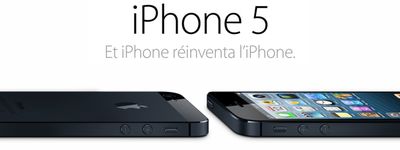Apple's Contracts With European iPhone Carriers Examined for Potential Antitrust Issues
The New York Times reports that regulators with the European Union are taking a close look at contracts between Apple and its iPhone carrier partners, seeking to determine whether Apple's strict terms amount to anti-competitive behavior. In particular, Apple's practice of requiring carriers to commit to selling a certain number of iPhones has placed pressure on the carriers to promote the iPhone above other alternatives.
[S]ome of Apple’s competitors complain that the big purchases Apple requires from carriers strongly pressure them to devote most of their marketing budgets to the iPhone, leaving little money to promote competing devices, said an executive at one of Apple’s rivals, who declined to be named to avoid jeopardizing carrier relationships.
Apple’s practice of telling carriers how many phones they must sell and threatening to penalize them shows just how powerful the iPhone has become as a bargaining chip. Other manufacturers typically allocate fewer handsets to each carrier than they estimate it can sell to ensure that there is little, if any, leftover inventory, an executive at one rival handset maker said.

Carriers are of course not required to carry the iPhone, but customer demand for the device means that most carriers believe they have little choice and must agree to Apple's terms in order to remain competitive in the marketplace.
The European Commission has not yet launched a formal investigation of Apple over its contract terms, and it is unclear what its next steps will be, with spokesman Antoine Colombani simply noting that the competition regulators are "monitoring the situation". For its part, Apple says only that its contracts are compliant with all local laws.
Popular Stories
iOS 19 will not be available on the iPhone XR, iPhone XS, or the iPhone XS Max, according a private account on social media site X that has accurately provided information on device compatibility in the past.
The iPhone XR, iPhone XS, and iPhone XS Max all have an A12 Bionic chip, so it looks like iOS 19 will discontinue support for that chip. All other iPhones that run iOS 18 are expected...
Apple today released iOS 18.4 and iPadOS 18.4, the fourth major updates to the iOS 18 and iPadOS 18 operating system updates that came out last year. iOS 18.4 and iPadOS 18.4 come two months after Apple released iOS 18.3 and iPadOS 18.3.
Subscribe to the MacRumors YouTube channel for more videos.
The new software can be downloaded on eligible iPhones and iPads over-the-air by going to...
Apple today released watchOS 11.4, the fourth major update to the operating system that runs on the Apple Watch. watchOS 11.4 is compatible with the Apple Watch Series 6 and later, all Apple Watch Ultra models, and the Apple Watch SE 2.
watchOS 11.4 can be downloaded on a connected iPhone by opening up the Apple Watch app and going to General > Software Update. To install the new software,...
Apple today released new firmware updates for all AirPods 4 and AirPods Pro 2 models. The new firmware is version 7E93, up from the 7B21 firmware that was installed on the AirPods Pro 2 and the 7B20 firmware available on the AirPods 4 and AirPods 4 with ANC.
It is not immediately clear what new features or changes are included in the new firmware, but we'll update this article should we find ...
While the iPhone 17 Pro and iPhone 17 Pro Max are not expected to launch until September, there are already plenty of rumors about the devices.
Below, we recap key changes rumored for the iPhone 17 Pro models as of March 2025:
Aluminum frame: iPhone 17 Pro models are rumored to have an aluminum frame, whereas the iPhone 15 Pro and iPhone 16 Pro models have a titanium frame, and the iPhone ...
Apple today released macOS Sequoia 15.4, the fourth major update to the macOS Sequoia operating system that launched in September. macOS Sequoia 15.4 comes two months after the launch of macOS Sequoia 15.3.
Mac users can download the macOS Sequoia update through the Software Update section of System Settings. It is available for free on all Macs able to run macOS 15.
With...
Visa wants to pay Apple approximately $100 million to be the new payment network for the Apple Card, reports The Wall Street Journal. As of right now, the Apple Card is on the Mastercard payment network, but that is set to change because Apple is ending its partnership with Goldman Sachs.
Both American Express and Visa are vying to replace Mastercard as Apple's card services provider, while...






















